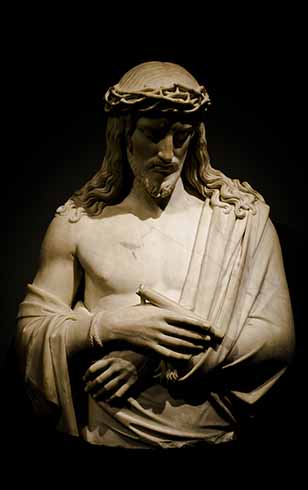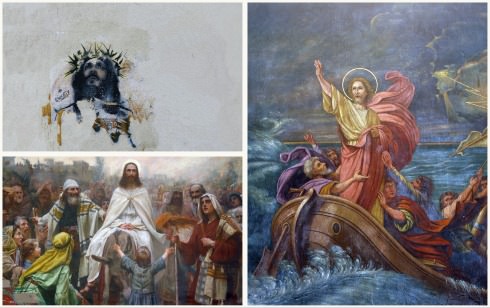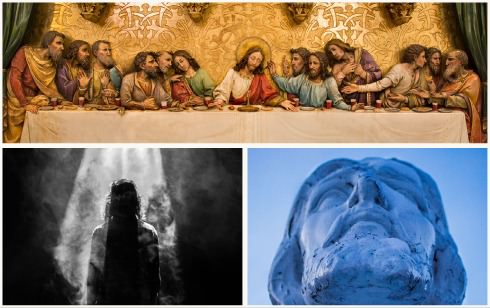 Jesus is at the centre of Christian faith.
Jesus is at the centre of Christian faith.
That is why we hear so much about him, often in complicated language about issues that we cannot understand. We might long for a simple explanation of why Jesus is important and how the different things said about him hang together. This edition of Australian Catholics speaks about our life as a journey. That is a helpful way to think of Jesus, too – as the centre of a journey.
Journeys
Not all human journeys are simple. Even a fairly straightforward story of how a boy grew up to be a great footballer, for example, might include quite complicated and demanding stages. He might have had to adjust to a death in his family, have been tempted to give up because it is too hard, and have been bullied by people in his club.
Such challenges confronted him with big questions about who he is, what he wants to be, and what really matters in life. These are not complicated questions, but sometimes hard to find an answer for.
There are also even larger questions that we sometimes ask ourselves. Such huge questions as, am I just an accident, or am I here for a purpose? Is the world just there, or is there a God responsible for it?
If there is a God, what is God like? Is our life all there is, or is there something after it? If it is hard for a footballer to find simple words to speak about his big questions, it is even harder to find them for the huge questions that being a human being puts to us.
Jesus’ life is a journey in which he constantly faced huge questions and found words to talk about them. Karl Barth, a Christian writer, described Jesus’ journey in two simple stages: the journey of the Son of God into a far country, and the homecoming of the Son of Man.
The Scriptures refer to Jesus as the Son of God and the Son of Man. These names point to his relationship to God and to humanity. They are just two of the many words used for him. Like Lord and Christ and the Word of God, they refer to his central part in God’s plan; Rabbi, Master and other names refer to his relationship to his followers.
Barth’s reference to ‘the far country’ also echoes Jesus’s own story of the journey of the Prodigal Son who stood up his father, cashed out his inheritance, went off to a far country to live it up, blew his cash, starved, decided to return home to his father as a servant, but was welcomed back as son.
The journey of the Son of Man into a far country
At first sight the comparison of Jesus with the prodigal son sounds extraordinary. But it reaches the heart of Jesus’ story. God sent his son to join us at the far limits of a sinful and desperate world. He put aside power and invulnerability and was dependent on others for life, education and growth, learned from experience, was tempted like us, and had to find his way. Like the prodigal son, his journey took him into a far country, a hostile and uncaring world. This is the world in which we human beings must live, and in which God joined us in Jesus. It is a beautiful world that God made and loved, but now made dangerous by human greed and quest for power.
We see the shape of the Son of God’s journey into a far country in the way Jesus lived and in what he taught. He invited us to accept God’s love and forgiveness and to trust in his promise to bring us into God’s new world. That meant following Jesus in leaving aside fear, walking boldly into the far country. To resist invitations to throw away our weapons, love our enemies and to trust that God will be with us wherever we walk, requires courage. People who invite us to live in this way are soon noticed, seen as a threat, and dealt with.
This happened to Jesus. He lived out his message that God loves all human beings and invites them to life with him, by healing people, driving out demons, and by eating with people considered disreputable. This vision of God’s love threatened the walls people had built around themselves for safety. His call to trust in a God who would lead them into his kingdom was also seen as an invitation to rebel against Roman rule. The way Jesus lived and what he said took Jesus into the most distant of far countries. He was marched out through the gates of Jerusalem and killed outside the city.
If that was all there was to the Son of God’s journey to a far country, it would give negative answers to all our big questions. It would say that God came, tried to win people, failed and was despatched.
It would say either that Jesus’ God didn’t exist, didn’t care, or couldn’t do anything for us; that Jesus was naïve in inviting us to trust in a life beyond the present; that goodness and love never win, and we should just try to get whatever we can out of life.
 The Homecoming of the Son of Man
The Homecoming of the Son of Man
God’s journey in Jesus, however, did not finish there. It continued with the homecoming of the Son of Man. If the first half of the story is God’s journey in Jesus, the second is our human journey with Jesus. Jesus is the centre of both parts of the journey. His death was the beginning of his homewards journey. He rose from the dead into a new life and brings us with him. In the Gospels Jesus appears to his disciples after his rising from the dead, eats with them and shares the joy of a loving community. This shows what life with God can now be like for his followers and what it will be like in God’s kingdom when we return with Jesus into the life of God.
The story of the homecoming of Jesus gives simple answers to our big questions about what God is like, what our lives are like, and what we can hope for. It speaks of a God who loves us enough to want to be with us and to stay with us even when rejected. It shows us that following the way of Jesus with all its difficulties and rejections is worthwhile, and that we can hope to share God’s joyful life. We are not alone, our lives are more than drift, and we have hope in the future.
Why say Jesus is divine and human?
Church language about Jesus did not get complicated because his story was complicated. It was simple. Problems arose because it was huge. People then tried to make it more believable by making it smaller.
Some people found it impossible to believe that an all-powerful and mysterious God could share our life of pain and struggle and be nailed on a cross. They simplified the story by saying that God picked out a special man to act and suffer on his behalf. It was not the Son of God who went into the far country but a human being who stayed there. Others believed that God did not lay his power and divinity aside in Jesus. They simplified the story by saying that God only appeared to learn from experience, to suffer and to die. God had no skin in the game. Both these stories of Jesus were small and took God out as the main actor in it.
The early Christians insisted on the large story of a God who really joined us in the human life of Jesus, and who gives us life. They realised that the Son of God really joins us in dying painfully in Jesus, and rises to bring us with him into the
life of God. They did not explain how it happened, but simply insisted that the one Jesus, who is Son of God and Son of man, is divine and human.
The journey of God to join our world in Jesus and to return with us is not broken but is a single journey.
That conviction is the heart of Christian faith. It leaves many questions unanswered because it takes us into the mystery of a God who is always more than we can understand. We struggle to find words to describe it. That is where the complications come from.
 Why is Jesus’ life important?
Why is Jesus’ life important?
We have focused here on the large story of God’s journey in Jesus. Jesus’ human life, including his childhood, education, preaching, relationship to Jewish groups and authorities and to Roman authorities, are central in that larger story.
For Christians the stories of Jesus life are important because they tell us about God’s journey to be with us. They speak with authority about God and how to live. We find God in Jesus’ appreciation of the beauty of the world, in his outrage at hypocrisy and cruelty, in the painful struggle to be faithful, and in his courage in following God’s path. These stories are more than a good way to live; They are God’s roadmap for our lives. We read the stories of Jesus’ life, not just with curiosity, but prayerfully because they take us deep into the magic of God’s journey with us in Jesus and invite us to follow in his way.
It is also helpful to read good historical studies of Jesus that situate him in the world of his time and tease out how the Gospel stories about him developed. These can enrich our understanding of Jesus and take us more deeply into the journey of God’s Son into the far country.
Jesus is a Jew forever
The big story of Jesus claims that the Son of God came into our world in the life of Jesus for all human beings. That makes some people ask why we bring so much of Jesus’ Jewish background into our Christian prayer and thinking. Why not lift him out of the Middle Eastern world and see him as the person who represents all cultures?
The reason for not doing this lies in the fact that the Son of God really joined us in a far country. He belonged there, and remains a Jew for all human beings. He reminds us that each human being is unique and is made in God’s image. We are not interchangeable. As Jesus was, we are all defined by our culture, our place, our language. That was also true of Jesus. He was born into a Jewish tradition and culture in which God had already been present. The stories that were central in Jesus’ identity were those of the freeing of God’s people from Egypt, and later from exile. He thought and prayed in the words of Israel’s prophets and poets. Through Jesus the Jew, God joined all human beings each in their own culture and place to show that we are enriched by our difference.
Christian faith in Jesus does not ask us first to sign up to a number of facts and beliefs about him, but invites us into the large story of God entering our human world and our own lives. It offers a way into the large questions about ourselves, our world and our future and a way of life built on hope.
Questions
- What big questions do you ask about your own world?
- What does the story of Jesus say about God?
- How does the story of the Prodigal Son help us understand Jesus?
- What difference does it make to say that Jesus is truly God and truly human?
- Why are the stories of Jesus’ life and teaching important?
- What kind of hope does Jesus’ story offer us?